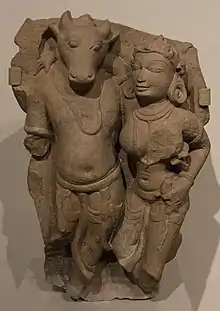| Gomukha | |
|---|---|
 Gomukha, c. 8th century, Gurjara-Pratihara |
In Jain cosmology, Gomukha is the guardian god or Yaksha (attendant deity) of Rishabhanatha, the first Tirthankara.[1][2]
Legacy
Worship
Gomukha along with Dharanendra is the most popular yaksha in Jainism.[3][4][5]
Iconography
According to Jain tradition, Gomukha is depicted as two or four armed yaksha riding on an elephant.[6] As the name suggests, gomukha has the head of a bull.[7][8] Gomukha carries a goad in left hand and noose in left. In other two lower arms gomukha carries varada and conch.[9] The yaksha-yakshi pair sculptures of Gomukha-Chakreshwari are one of the most favoured along with Ambika-Sarvanubhuti and Dharanendra-Padmavati.[10] The image of Gomukha yaksha in Ellora caves is noteworthy.[11]
 Gomukha at Dadabari, Mehrauli
Gomukha at Dadabari, Mehrauli Gomukha at Trilok Teerth Dham
Gomukha at Trilok Teerth Dham Gomukha at Shri Atma Vallabh Jain Smarak
Gomukha at Shri Atma Vallabh Jain Smarak
See also
Wikimedia Commons has media related to Gomukha.
References
Citation
- ↑ Bruhn 1969, p. 26.
- ↑ Shah 1995, p. 18.
- ↑ Campbell 1884, p. 117.
- ↑ Kelting 2009, p. 240.
- ↑ Pereira 1977, p. 29.
- ↑ Shah 1987, p. 117.
- ↑ Pereira 1977, p. 42.
- ↑ Bruhn 1969, p. 24.
- ↑ Shah 1987, p. 227.
- ↑ Tiwari 1989, p. 13.
- ↑ Pereira 1977, p. 61.
Source
- Campbell, James M. (1884), Gazetteer of the Bombay Presidency: Dháwár, Gazetteer of the Bombay Presidency, vol. 22, Bombay: Government Central Press
- Shah, Umakant Premanand (1987), Jaina-rūpa-maṇḍana: Jaina iconography, Abhinav Publications, ISBN 978-81-7017-208-6
- Tiwari, Dr. Maruti Nandan Prasad (1989), Ambika in Jaina Art and Literature, Bharatiya Jnanpith
- Kelting, M. Whitney (2009), Heroic Wives Rituals, Stories and the Virtues of Jain Wifehood, Oxford University Press, ISBN 9780190452865
- Pereira, Jose (1977), Monolithic Jinas: The Iconography of the Jain Temples of Ellora, Motilal Banarsidass, ISBN 9788120823976
- Bruhn, Klaus (1969), The Jina-Images of Deograh, Universiteit van Amsterdam, Institute of South Asian archaeology
- Shah, Umakant Premanand (1995), Studies in Jaina Art and Iconography and Allied Subjects in Honour of Dr. U.P. Shah, Abhinav Publications, ISBN 9788170173168
This article is issued from Wikipedia. The text is licensed under Creative Commons - Attribution - Sharealike. Additional terms may apply for the media files.